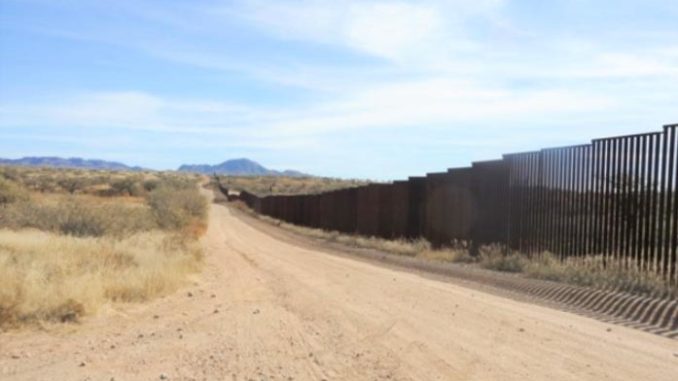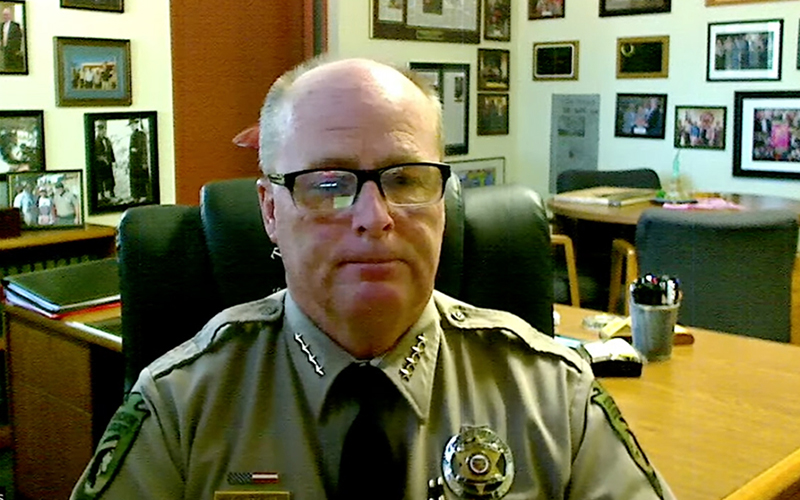
By Emily Sacia
WASHINGTON – The Cochise County sheriff told a House committee Wednesday that border-related crimes are at an “all-time high,” and would only get worse without comprehensive immigration reform.
Sheriff Mark Dannels, testifying to a House Judiciary subcommittee hearing on human trafficking, said that illegal border entries rose from 400 migrants a month to 8,000 migrants a month over a two-year period, based on images captured by a camera system run by his department.
“Our border is in really bad shape right now … and that’s saying it lightly,” Dannels testified. “We have to be actively engaged in securing our border, addressing immigration reform and start addressing collectively these issues down here. It’s only going to get worse.”
But most of the witnesses at the hearing, many of them survivors of trafficking themselves, made little mention of the current border situation in their testimony. Instead, they cited a long list of actions they said need to be taken, focusing on protecting victims and prosecuting both the traffickers who coerced them and the people who used them – for trafficked sex and trafficked labor.
Martina Vandenberg, founder of the Human Trafficking Legal Center, said illegal immigration is not the issue.
“Over the years, all of my forced labor survivor clients had one thing in common: They all entered the United States on perfectly legal visas,” Vandenberg’s written testimony said.
“They arrived with contracts and the promise of a good job,” she said. “Instead, they found themselves trafficked into forced labor, stripped of their identity documents, held in debt bondage, threatened with deportation, and, in some cases, physically and sexually abused.”

Cochise County Sheriff Mark Dannels told a House committee on human trafficking that border-related crimes are at an “all-time high,” but other witnesses said border crime has little to do with human trafficking. (Photo courtesy House Judiciary Committee)
Much of the hearing played out along the same lines, with witnesses and lawmakers generally addressing two different topics.
Democrats and trafficking experts used the hearing to push for passage of bills like the Stop Human Trafficking in School Zones Act and reauthorization of the Trafficking Victims Protection Act. Republicans focused on the historic number of apprehensions at the border in recent months and what they called the Biden administration’s failure to address the problem.
“The failed policies of this administration encourage and facilitate Mexican drug cartels, transnational criminal organizations and other malevolent actors to engage in human trafficking and smuggling across our southwestern border,” said Rep. Andy Biggs, R-Gilbert.
The hearing came as the administration is trying to lift Title 42, a pandemic-era health policy that lets border patrol agents turn back asylum seekers because of the potential health risk they could present. That policy has been used to turn back 1.8 million asylum seekers since March 2020.
But the Centers for Disease Control and Prevention said this month that there is no longer a health justification to invoke the policy, and Homeland Security proposed ending Title 42 on May 23. But three states, including Arizona, filed suit, claiming the administration did not have a plan to handle the expected surge in migrants, and a federal judge in Louisiana agreed this week to temporarily block the move.
Rep. Steve Chabot, R-Ohio, said Wednesday that lifting Title 42 would not just overwhelm already strained border resources, but could increase the likelihood of vulnerable people being trafficked.
“The massive influx of illegal border crossings we’re experiencing now will only make it easier for human trafficking networks to flourish by exploiting our relaxed border security,” Chabot said.
Stacey Sutherland, with the Arizona Anti-Trafficking Network, said it is not far-fetched to assume that more border traffic might mean more human trafficking. But she said that anyone stopped at the border will be screened for trafficking. And she said it is important to remember the difference between human trafficking and human smuggling.
Human trafficking is “an underground crime” that requires coercion, said Sutherland, director of the network’s Training and Resources United to Stop Trafficking program. Smuggling does not involve coercion, although she acknowledged that individuals smuggled into the country can become trafficking victims.
Sutherland could not comment on Dannels’ numbers, except to say that it “doesn’t mean there’s an uptick in crime. It just means we’re able to see the crime more clearly, see the victimizations more clearly.”
But while DHS and Immigration and Customs Enforcment provide screenings at the border to identify human trafficking victims, Dannels said more needs to be done.
“We got to come together to do a better job because citizens and those being trafficked are all victims” that local, state and federal officials took an oath to protect, Dannels said. “And right now we’re not collectively doing that.
“This is not about politics, this is about people,” he said.
